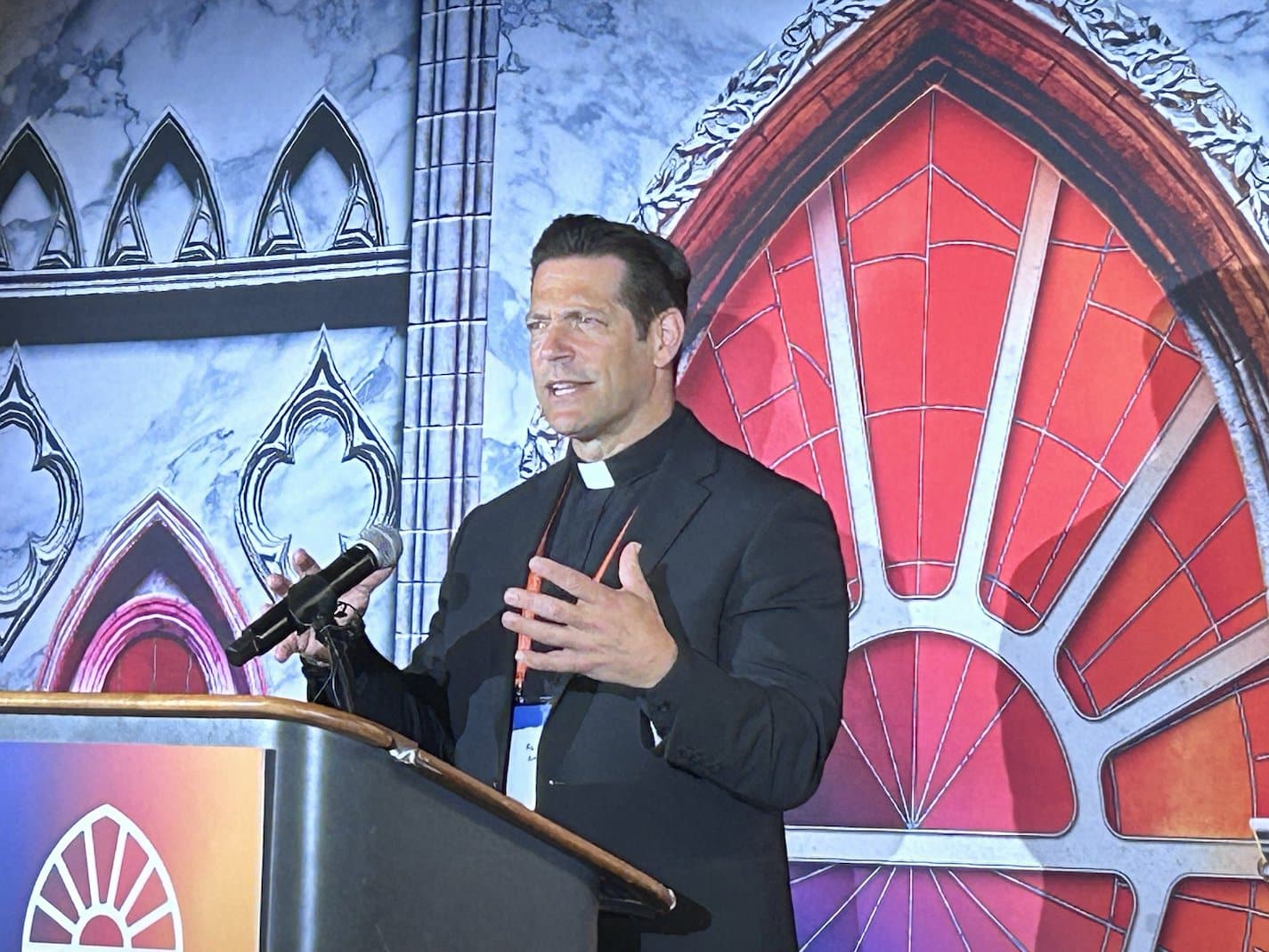INDIANAPOLIS (OSV News) — There are few Catholics in the country, and even the world, who don’t know the name of Father Mike Schmitz. The college campus ministry chaplain from the Diocese of Duluth, Minnesota, and the keynote for the National Eucharistic Congress‘ July 18 revival session in Indianapolis, is internationally renowned for his “Bible in a Year” and “Catechism in a Year” podcasts, provided through Catholic publisher Ascension, that have topped the podcasting charts in recent years.
At a press gaggle with reporters a few hours before his talk in Indianapolis, Father Schmitz offered his wisdom on a number of topics — especially evangelization and the importance of Eucharist. From that conversation, here are five tips curated from Father Schmitz’s experience to help Catholics become better evangelizers.
1. Know your own story first.
In order for Catholics to feel truly comfortable talking to people who are not Catholic, or even Catholics who fell away from practicing their faith, about why they should love the Church, Father Schmitz said they must first understand their own stories.
“I think that a lot of times we disqualify ourselves — like, ‘I don’t want to impose my faith on anyone. I don’t want to, you know, shove it down anyone’s throat,'” Father Schmitz said. “But what if someone you know came up to you and said, ‘Could you please tell me about your relationship with Jesus?’ Or, ‘Please tell me about what you love about the Catholic Church?'”
If that were to happen, would Catholics know how to respond?
“Do you know? Do you know your story?” he asked. “Do you know why you love the Catholic Church? Because until we do that, that work of just diving deeply and saying, ‘What would I say?’ … until then, I’m just making excuses for why I’m not doing it.”
2. Encourage and engage in encounters with the Lord.
“Adoration, I really believe, can become a place where Jesus gets to win hearts to himself,” Father Schmitz said, offering an example of a man he knew who wasn’t baptized and who went with some friends to Eucharistic adoration.
“He had no idea what to do,” Father Schmitz said. “And he said, ‘I looked up, and I looked at Jesus in the Eucharist. I didn’t know that was Jesus in the Eucharist. I didn’t know what that was.’ But he immediately started crying.”
The man told Father Schmitz: “I didn’t know what that was. I just knew that it’s holy.”
Bringing people to Jesus and to “let him do what he does” — perhaps with a heads up as to what they’re going to encounter — “that is so powerful,” he said.
The quiet of Eucharistic adoration also helps disconnect us from the many distractions we face in our culture today, he said.
“There’s something so critically important about us having the capacity to spend time in silence,” Father Schmitz said. “There before the Lord, where he tells us who we are and reveals his heart to us.”
“I think we have a culture that is fully filled with distraction more than ever. And that distraction doesn’t just take us away from ourselves, it doesn’t just take us away from reality; but (it) also brings us into this warp zone of comparison and of false comparison,” he added.
“There’s something about the Eucharist, our Lord in the Eucharist, that grounds us in this place of peace — a place that doesn’t involve comparison, a place that doesn’t involve distraction, and we actually get to sit with what’s going on,” he said. “And it’s in those moments when we find ourselves face-to-face with the things we need to wrestle with.”
When unsure what to say or how to evangelize, spending time with the Lord gives Catholics something to offer, Father Schmitz added.
“The Lord, he loves every one of us,” he said. “He loves all of you. To be able to spend time with him in the Eucharist is to let him love you. And you’ll always have something to say about him. You’ll always have something to offer.”
3. Work hard to earn trust.
When trying to evangelize, Catholics must first earn the trust of those with whom they are communicating, Father Schmitz said.
“Maybe it comes from working with high school students, junior high students, and college students, where it’s like: no, there’s no guarantee that the people who showed up for Mass today even believe any of this,” he said. “And so I’m going to try to speak in a way that hopefully does that, and then hopefully speaks to whatever your experience is. And I think that’s so crucially important.”
4. Know there are better things than being a celebrity.
Speaking to a seminarian who asked him what he’d say to other seminarians who see “celebrity priests” like Father Schmitz and Father Josh Johnson (podcaster, author and one of the emcees of the National Eucharistic Congress) and might want to be like them, Father Schmitz related a story of another priest of the Diocese of Duluth named Father Ben, whom he met when Father Ben was 17.
Father Ben was full of life and full of evangelical zeal and was eventually ordained a priest, Father Schmitz shared. He ran marathons and participated in triathlons. But when Father Ben was 31 years old, he had a stroke after one such triathlon. He recovered, but later had a second one. Now in his late 30s, Father Ben is no longer able to walk and no longer able to celebrate Mass on his own, Father Schmitz said.
“The image of the priesthood is not Father Josh or me,” Father Schmitz said. “The image of the priesthood is Father Ben. Because Jesus as priest is what? Jesus on the cross. He’s the victim. He’s the priest. So if you’re going to be a priest, you have to also be willing to be the victim who’s offered up.
“Microphones are fine,” he said. “But (Father Ben is) living his priesthood more radically, as radically as anyone is called to.”
Father Schmitz added that being able to work with Ascension in his podcast work “protects his heart” because he doesn’t spend time analyzing if people are liking what he says or not.
“One of the graces of being able to work with Ascension is I get to figure it out, say it, and then send it — and never think about it again,” he said.
5. Fight the threat of indifference with repentance.
Because we are no longer in an era where it is a given that the Faith will be passed along to the next generation, Father Schmitz said, “we need to never stop teaching” the Faith.
On the other hand, he added, the problem is not just ignorance, but an even greater threat: that of indifference.
“Indifference is the poison of our age,” he said. “And so if ignorance is meant to be replaced by knowledge, then indifference is meant to be replaced by love.”
And the only way to get there, he said, “is through repentance.”
“And I think that’s another big message of this Eucharistic revival: You can’t have a revival without repentance.”







